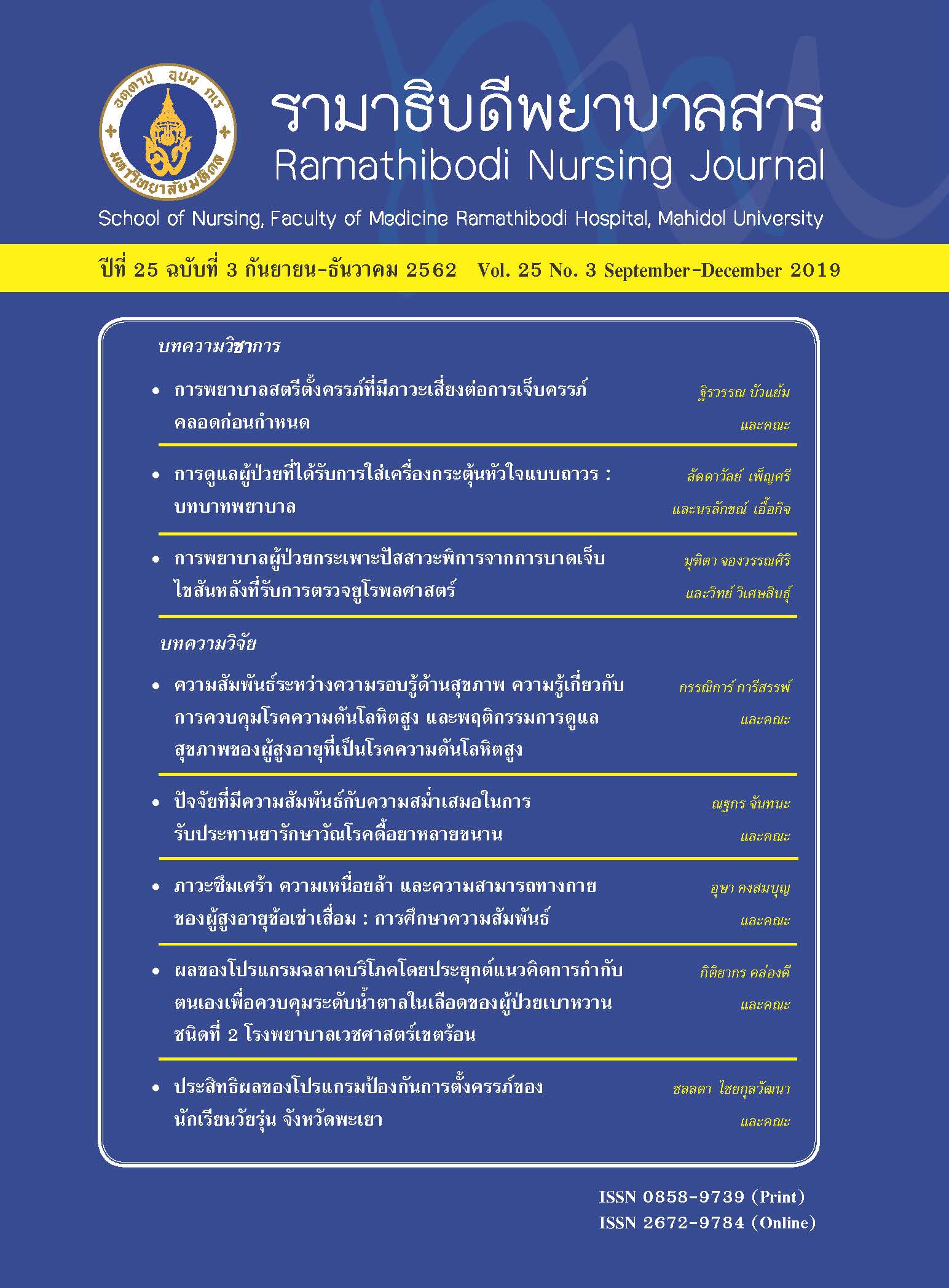Effects of the Smart Diet Program Applying the Concept of Self-Regulation for Diabetes Control in Type 2 Diabetic Patients in Hospital for Tropical Diseases
Main Article Content
Abstract
This quasi-experimental research aimed to study the effects of the smart diet program for diabetes control in type 2 diabetes patients. A sample of 30 patients was divided into experimental and comparison groups, with 15 patients in each group. The experimental group received the smart diet program applying the self-regulation concept to design the activities for 12 weeks. The program activities included knowledge of diabetes diet, skill training on self-observation, decision making, self-reaction, and supporting diet control behavior continuously and a follow-up telephone interview was done. Data collection was done during the pre and post intervention program on the 12th weeks by interviewing the subjects and testing of fasting blood sugar and HbA1c level. Data were analyzed by descriptive statistics and inferential statistics, i.e., Chi-square, Paired sample t-test, Independent t-test and Mann- Whitney U test.
The research results showed that after the experimentation, the experiment group gained significantly higher level of perceived self-efficacy, outcome expectation of the diet control, and diet control behavior than before the experimentation (p < .05). Fasting blood sugar and HbA1c level of the experimental group also significantly decreased compared to the pre-experiment program (FBS from 196.9 mg/dl to 141.4mg/dl, p = .014; HbA1c from 8.6 mg/dl to 6.9 mg/dl, p = .002). Therefore, this program should be recommended and applied to other public health facilities with similar context.
Article Details
บทความ ข้อมูล เนื้อหา รูปภาพ ฯลฯ ที่ได้รับการตีพิมพ์ในรามาธิบดีพยาบาลสาร ถือเป็นลิขสิทธิ์ของวารสาร หากบุคคลหรือหน่วยงานใดต้องการนำทั้งหมดหรือส่วนหนึ่งส่วนใดไปเผยแพร่หรือเพื่อกระทำการใด ใด จะต้องได้รับอนุญาตเป็นลายลักษณ์อักษรจากรามาธิบดีพยาบาลสารก่อนเท่านั้น
References
https://www.diabetesatlas.org/across-the-globe.html
2. Bureau of Non-Communicable Diseases, Department of Disease Control, Ministry of Public Health. Annual report
2016. Bangkok: Kitjakanrongpim Veteran Relief Organization Royal Patronage; 2016. (in Thai)
3. Medical Record Department, Hospital for Tropical Diseases. Medical record review of diabetic patients.Hospital for Tropical Diseases; 2560. (in Thai)
4. Kumrueng K. Benjakul S. Kengganpanich T.Kengganpanich M. Effect of self-regulation program for volume overload control in the end state chronic renal failure patients receiving continuous ambulatory peritoneal dialysis. Journal of Public Health. 2017;43(3):326-38.(in Thai)
5. Tanomcheep R. Duangsong R. Effects of health education program on blood glucose control among diabetes type 2
patients [thesis]. Khonkaen: Khonkaen University; 2017.(in Thai)
6. Yookong S. Sompopjareun M. Kungganpanich T.Ravivorakul T. Effect of self-regulation program for diet control behavior in type 2 diabetic patients. National Health Education Conference 17th “The role of people for health
behavioral modification”; May 14-16,2015 Jomtien Palm Beach Hotel and Resort Pattaya: Chonburi. (in Thai)
7. Erin A, Edward M. Impact of brief intervention on selfregulation,self-efficacy and physical activity in older adult
with type 2 diabetes. J Behavioral Med. 2015;38(1007):886-98.
8. Sangsuwan S. Aatsawasaisuvikom W. Homsin P. Effect of self-regulation program with clinical data on diet
behavior and blood sugar level of type 2 diabetic patients who are unable to control blood sugar level. Journal of
Nursing Burapa University. 2011;19(3):23-33. (inThai)
9. Kongjareun S. Wattana C. Haniratsai T. Effect of self-regulation program for blood pressure control and risk of
stroke in Thai Muslim. Nursing Journal. 2013;40(2):22-32. (in Thai)
10. Sommung P. Tansakul S. Theravivat M. Kungganpanich T. Effect of “BLESS” program for exercise behavior in type 2 diabetic patients. Bangkok:Hanghunsuanjumkatrakpim; 2016. (in Thai)
11. Tansakul S. Theory and model for applying health education and behavioral science.2nded.Bangkok:Yuttarinkanpim; 2005. (in Thai)
12. Bandura A. Human agency in social cognitive theory.American Psychologist.1989;44(9),154-96.doi:10.1037/0003-066X.44.9.1175
13. Vorapongsaton T. Research principles for public health.Bangkok: Chulalongkorn University, Nikondusitsin;1997. (in Thai)
14. Jariwatkul A. Biostatistics for health science research. 2nd ed. Khonkaen: Lungnanawittaya; 2005. (in Thai)
15. Ongiem A. Vichitvejpaisal P. Research tool quality inspection. Thai Journal of Anesthesiology.2018;44(1):36-42. (in Thai)
16. Diabetes Association of Thailand under The Patronage of Her Royal Highness Princess Maha Chakri Sirindhorn.
Clinical Practice Guideline for Diabetes 2017. 3nd ed.Pathum Thani: Romyen Media; 2017. (in Thai)
17. Noipan S. Taniwattananon P. Kongin W. Effect of selfmanagement promoting program on food consumption
behaviors in the elderly on continuous ambulatory peritoneal dialysis. Hat Yai Conference 4th “Research for
Thai society development”; May 10, 2013; Hat Yai:Songkhla. (in Thai)


